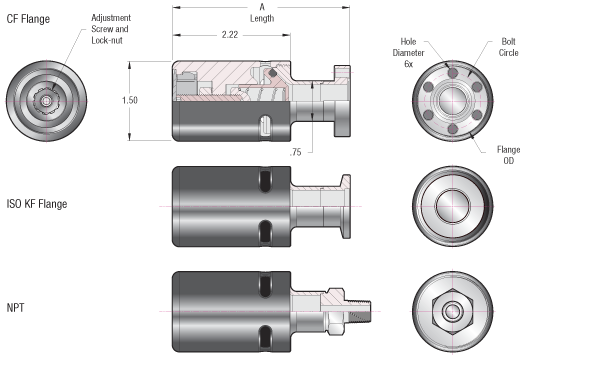PRV on a 1.33" CF Flange, Pressure Relief Valve
2 PSI Pressure Relief Valve (PRV), mounted on 1.33" CF Flange
This is a test of the "site alert message system". (edited)
2 PSI Pressure Relief Valve (PRV), mounted on 1.33" CF Flange
2 PSI Pressure Relief Valve (PRV), mounted on a 2.75" CF Flange
6 PSI Pressure Relief Valve (PRV), mounted on a 2.75" CF Flange
2 PSI Pressure Relief Valve (PRV), mounted on a ISO NW16 KF Flange
6 PSI Pressure Relief Valve (PRV), mounted on ISO NW16 KF Flange
2 PSI Pressure Relief Valve (PRV), mounted on ISO NW40 KF Flange
2 PSI Pressure Relief Valve (PRV), mounted on an 1/8 Male NPT Fitting


Vacuum systems are only designed to operate under external (atmospheric) pressure. Accu-Glass’ "Pressure Relief Valve (PRV) offers a means of protecting vacuum vessels against internal over-pressurization. There are many scenarios in which rapid pressure buildup inside a vacuum vessel may occur — such as a runaway gas back-fill operation. Besides protecting delicate instruments and equipment, a vacuum relief valve also minimizes risk of injury to system operators and other lab personnel.
Pressure buildup inside a vacuum vessel pushes on a spring loaded, elastomer sealed, piston. Once the pressure relief valve’s calibrated pressure limit is reached, the piston is displaced breaking (disengaging) its seal and providing instant pressure relief in the vessel. Unlike single use ‘burst disc’ devices, a Pressure Relief Valve's unique design allows it to be used over and over.
For systems operating at high vacuum pressure regimes, Pressure Relief Valves (PRV's) are the economical alternative to single-use burst disc products. Standard Pressure Relief Valves are factory-calibrated for a 2 PSI relief pressure. However, our PRVs can be adjusted to as low as 0.5 PSI relief pressure, if required for your application.
CLICK ON A VACUUM PRESSURE RELIEF VALVE BELOW TO SEE DETAILED SPECIFICATIONS OF THE VALVE.